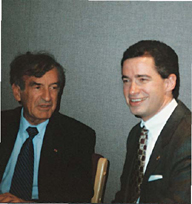The Confession (43 page)
Authors: James E. McGreevey

Â
“HOW MUCH JOY CAN YOU HANDLE?”
This was the most complicated question that Kingsley Gallup, my therapist, asked me to contemplate. Of all the lessons I learned at the Meadows,
confronting the issue of joy got closer than anything else to my problem. I'd made a conscious decision in eighth grade that my joy was dispensableâthat in order to be accepted by others, I couldn't follow an ordinary heart's course through life.
After years of denial, my ability to know joy was gnarled and mutated. How else could I explain my attachment to Golan? A man almost nobody liked, a man I thought I'd loved, who in the end was nothing but disaster. There never was a promise of
joy
in that relationship, only a temporary reprieve from my misery.
In place of joy, I'd substituted pride. I had all the answers; I was my own master. I moved swiftly through a career in order to avoid the murmurs of my heart.
Finally, I answered, “Joy in abundance.”
For the first time in my life I believed I had a right to my heart and all the knowledge there. I came to believe that God wants us all to be happy, to relish our lives in the moment. God wants us to love and reach for joy. That is why he gave us the capacity to love in the first place, setting humans apart from the rest of His creation.
I remembered the words of Sister Anthony: “God is love.” Of course! It took me four decades to come back around to that knowledge, though I'd had it all along.
“What does God want from you?” This was the last question Kingsley posed.
Before my time at the Meadows, I might have had a single answer: God wants me to be straight. Reconnecting with the Higher Power in Arizona allowed me to see God as compassionate and gentle, accepting and supportive. This healed me spiritually. I started praying every day while in treatment, something I hadn't done since childhood. My faith was nourishing again, not punitive or fearful.
I wrote out a long list of things I believe God wants from me. Passion, struggle, compassion, courage, convictions, charity, decency, gentleness, and integrity.
Joy, most of all.
Â
AT THE END OF THE MONTH, IN OUR LAST EXERCISE AND RITUAL,
the other patients and I were asked to throw unwanted things on a big bonfire. I brought notepaper and other documents that bore my name under the governor's seal. I was immensely proud of being elected governor and of many things we accomplished during my short term. But I knew I hadn't earned the job on my own merits. Symbolically, I was rejecting the high office for which I had
planned my work and worked my plan
all of my lifeâa plan conceived in the dim light of the closet. It was a false me who'd won that election. The job was never rightfully mine.
I also brought along something Dina had mailed meâlegal documents seeking a divorce. I didn't burn them because I was angry at her for going her own way. Nor did I mean to symbolize a desire that we'd never married. Though I wish we'd been happier together, I don't regret my years with Dina, which gave me the gift of Jacquelineâshe and Morag are my two favorite people in the world.
I threw those papers onto the pyre because they represented the past. From now on, I'm heading into the future.
Â
I CONTINUE ATTENDING TWELVE-STEP MEETINGS AND PRESS ON
with my addiction recovery. I worry about how publishing this book will affect my healing journey. I know I do not come across in heroic terms. Even the parts of my legacy I'm proud of were products of my addiction, borne of the compromises I'd made. Having finally realized my errors is hardly heroic.
I do know that many people have told me that they were moved by my coming out speech. I don't flatter myself by thinking I am some sort of role model for anybodyâI certainly hope I'm not. But people connected with my suffering, I think. An astonishing number of Americans live inauthentically and are unhappy living that way.
I received many letters from gay people confessing their own secret struggles with candor and shameâone from a young man I'd known for a long time who only came out after watching my own declaration. A doctor in New York said he was moved by my “courage, dignity, and strength,” and
that I was “truly an inspiration to many.” A public school teacher in Philadelphia wrote to say that by coming out I had “reinforced the idea that homosexuals are people, too,” a fact that is sadly not apparent to everyone.
I got letters written in the shaky hand of my parents' generation, from older women and men who surprised me with their equanimity. “There is no need for you to apologize for anything!” declared a woman who described herself as a lifelong Republican. A man in Hillsborough wrote requesting an autographed photograph, adding this surprisingly tender postscript: “I know that the right partner will come along.”
But the most surprising letters I received were from people responding to my broader struggle to realign my life in truth. Literally hundreds of people, gay and straight, wrote to express their own hopes for authenticity. In my tortured arrival at candor, some saw a reflection of their own suffering, which gave them courage and relief. It is as the philosopher Baruch Spinoza said in
The Ethics:
“Emotion, which is suffering, ceases to be suffering as soon as we form a clear picture of it.”
“I read the text of your resignation several times, and I realized that this was no ordinary man speaking,” wrote another Philadelphian. “I thought of my own feelings and those of countless others who, when we were young, knew that something wasn't quite right with us and became, as you said, âambivalent' and âconfused.' There was no one for any of us to talk to or confide in, to show us our unique truths. Perhaps at my age I should no longer be looking for heroes. But if I'm permitted to do so, you should know that you're at the top of a very short list.”
My favorite letter came by e-mail from an eighteen-year-old college student in New York State who became transfixed and empowered by what he saw as my “beautiful time of self-discovery.”
“I cannot help but admit that every time I see you now, whether in a picture or commercial, I see something truly beautiful and vibrant within you. Maybe it's the potential to be exactly who you want to be. Maybe it's an honesty that emanates from you, an honesty that has proven truer than I'd imagined. I'd like to say, âWelcome home.' The decision you made was a difficult one. But a life of greater truth, love, and beauty awaits you behind the door you've opened, in perfect love and perfect trust.”
If any good comes from sharing my story, I hope I can inspire others to open their doors and reveal whatever is hidden there so that their own true beauty shines through.
Â
MY RECOVERY MAY, AS RAY SAID, TAKE A LIFETIME. ON SOME DAYS,
I can see only the work ahead. For one thing, my memory remains blurry, even after this long period of self-inspection. Perhaps my forgetfulness is self-serving; I know I violated my own moral precepts in ways I didn't want to remember. Or maybe, as some gay people have told me, repression takes its toll on memory. In any case, I think the cause is the same: shame. The compromises were too great. In order to keep going, I fractured.
I know that I must locate these memories to complete my journey. It's my central challenge these days, in fact. I'm committed to a searching and fearless rigorous moral inventory of all the things I did wrongâthe fourth step. I don't know how long it will take me to finish my moral inventory; nor do I know how easily I'll be able to forgive myself once I'm done. I'm prone to self-recriminationâanother problem to overcome. I just know I'll keep going to meetings until I can look in the mirror and accept my own forgiveness, even knowing how many people I've hurt or let down. That will be an amazing day.
But the work doesn't end there. I've still got to compile a list of all those whom I have harmed and make amends to them all directly. This is the most onerous part of recovery. From several people, I have already begged and received forgiveness: my parents and sisters, for example. Yet I have a ridiculously long list of people I haven't yet found a way to tell how sorry I am.
One of those people is Golan. When I got out of the Meadows, I hired a researcher in Israel to locate a phone number for him, thinking I wanted to apologize for all those things that made him feel so inadequate and angry. I wanted to apologize for hiring him onto my staff in the first place, which set into motion this long and torturous history.
I wanted to know that he was all right and to tell him I wished him no harm.
But I have not had the nerve to call him. Perhaps, as I work the steps,
I'll find that courage one day. Until then, I become more authentic and integrated one day at a time. I am reminded of the question Abba Moses, the ancient desert monk, posed: “Can a man every day make a beginning of the good life?”
To which Abba Silvanus replied, “If he be diligent, he can every day and every hour begin life anew.”
There is no fear in love; but perfect love casteth out fear: because fear hath torment.
â1
JOHN
4:18
Photo 1

Jack and Ronnie McGreevey's firstborn child
Photo 2

Sgt. James E. McGreevey, my uncle and namesake, and my father's hero
Photo 3
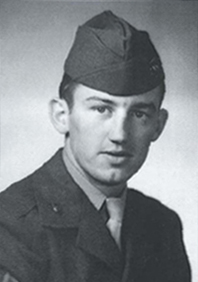
My father, Jack McGreeveyâthe greatest patriot I know
Photo 4
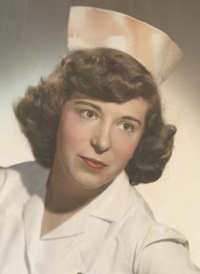
My mother, Ronnie. From my parents I learned the value of a life of service.
Photo 5
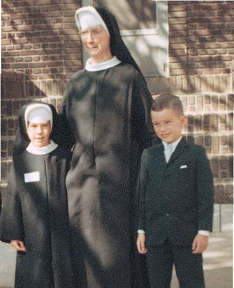
With Caroline
(left)
at St. Joseph's Convent in Carteret
Photo 6
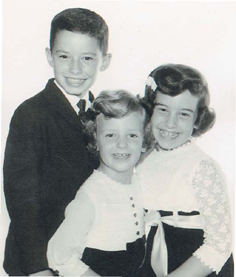
The McGreevey kids: Jimmy, Sharon, and Caroline
Photo 7
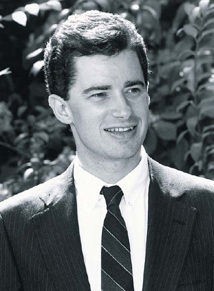
My first campaign photo
Photo 8
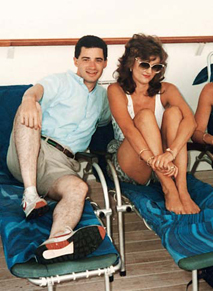
On the cruise where Kari and I first met
Photo 9
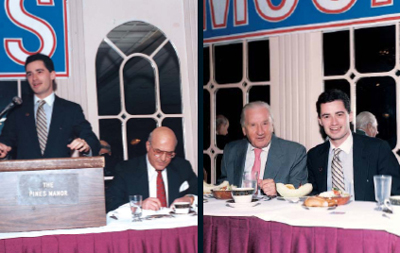
With mayors JoJo DeMarino of Woodbridge
(left)
and George Otlowski of Perth Amboyâtwo of the lions of local New Jersey politics
Photo 10
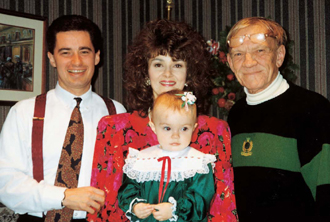
With three of the most important people in my life: Kari, our beautiful daughter Morag, and Jack Fay, my political mentor
Photo 11
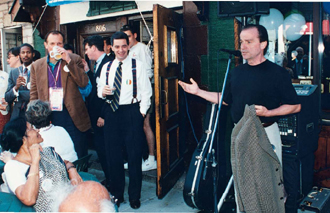
With Ray Lesniak
(left with coffee cup)
and John Lynch
(right)
at a Chicago Irish pub during the 1996 Democratic convention. Lynch and Lesniak were two of the smartest and most powerful bosses in Jersey politics throughout the 1990s.
Photo 12
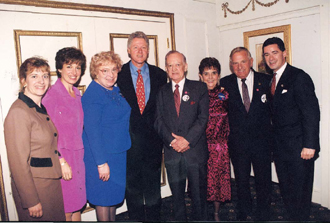
My family with Bill Clinton during the 1997 campaign.
(From left)
My sisters Sharon and Caroline, Mom, Clinton, Dad, and my aunt and uncle, Kathleen and Herb Smith.
Photo 13
